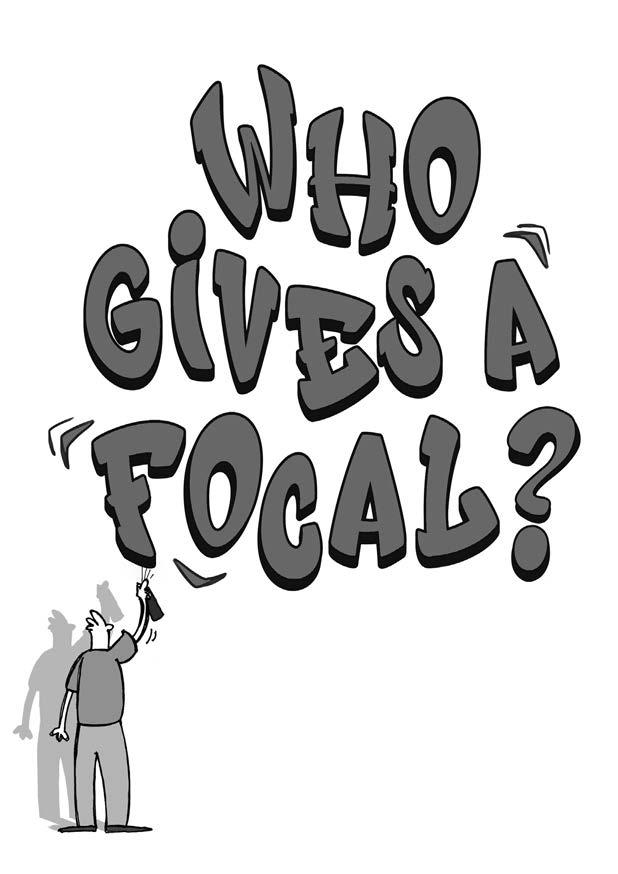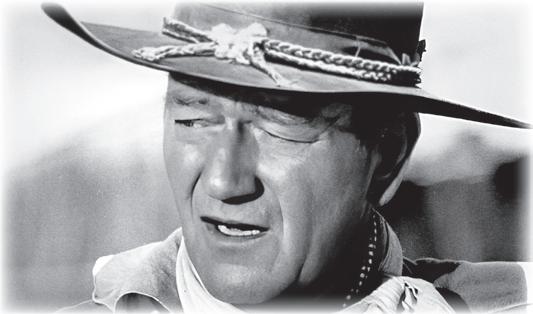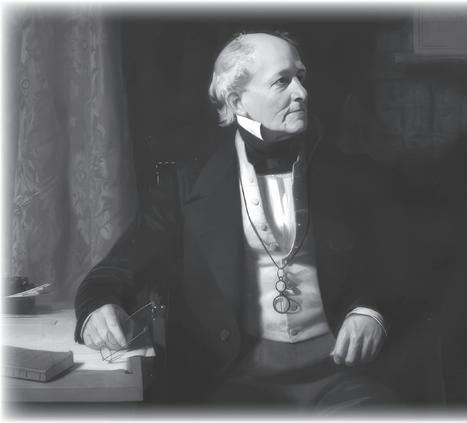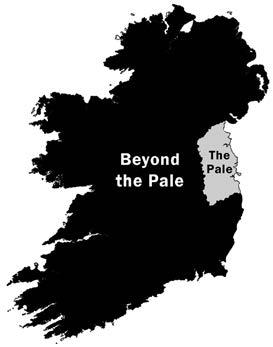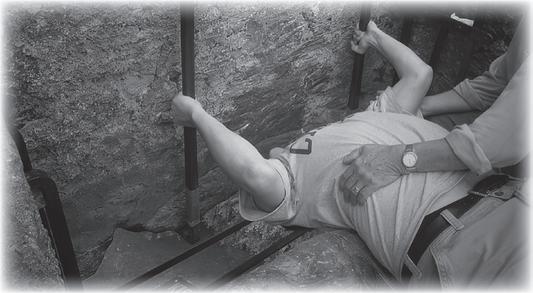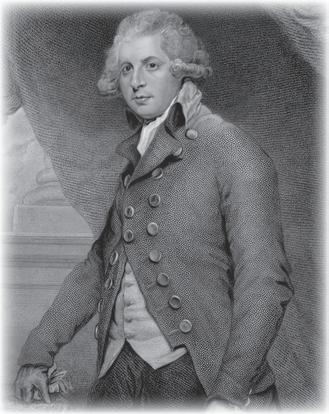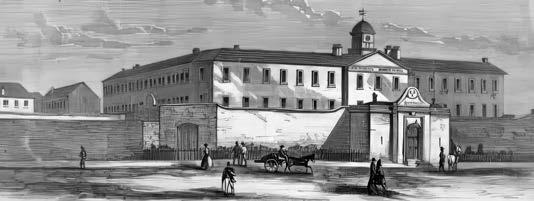Colin Murphy & Donal O’Dea
A hundred words and phrases Ireland gave the English language
First published 2024 by e O’Brien Press Ltd, 12 Terenure Road East, Rathgar, Dublin 6, D06 HD27, Ireland.
Tel: +353 1 4923333; Fax: +353 1 4922777
E-mail: books@obrien.ie; website: obrien.ie
e O’Brien Press is a member of Publishing Ireland.
ISBN: 978-1-78849-524-0
Text and illustrations © Colin Murphy and Donal O’Dea 2024 e moral rights of the authors have been asserted.
Editing, design and layout © e O’Brien Press 2024
Text design by Emma Byrne
All rights reserved. No part of this publication may be reproduced or utilised in any form or by any means, electronic or mechanical, including for text and data mining, training arti cial intelligence systems, photocopying, recording or in any information storage and retrieval system, without permission in writing from the publisher.
8 7 6 5 4 3 2 1
28 27 26 25 24
Printed and bound by Opolgraf, Poland.
e paper in this book is produced using pulp from managed forests.
Photograph credits
Wikimedia Commons: pp 7, 8, 12, 17 (Brian Rosner), 21, 23, 25, 29 (Cisko66), 31 Gerard Lovett, 37, 38, 40 (Maria Delaney), 46,49, 51 (Tony Barnard, LA Times), 54, 58, 62 (Geo rey Barker), 63 (Rob Hurson), 66, 70, 76, 79, 87, 88, 90, 92 (Robert Ashby), 94 (Shisma), 100, 102, 107 (David Spy), 112 (Michael Wuertenberg), 115, 120, 136, 139, 141 (Tim Dorr), 144 (Andrew Parsons), 146 (Ed Yourdon), 148, 157, 160; istockphoto: pp 56 (agustavop), 84 (Ryan J. Lane), 118 (daizuoxin), 135 (Willrow Hood); Dreamtime: p. 71 (Wivama00) ; Alamy: p. 132 (Andrii Iemelianenko).
Every e ort has been made to contact the copyright holders of material reproduced in this book. If any infringement of copyright has occurred, the owners of such copyright are requested to contact the publishers.
Published in
Balbriggan (noun)
Some people may not be aware of the fact but the name of the north County Dublin town was on the lips, or more accurately, on the backsides of countless people all over the world back in the nineteenth century.
Balbriggan, in case you didn’t know it, is a fabric, and a a ous one at that. t was a finel knitted cotton or wool material that was originally used for men’s underwear, which covered almost the entire body from neck to ankles and everything in between. It was napped on the inside so that men’s sensitive dangly bits would be nice and cosy. In fact, the boys reported them so cosy that soon the ladies had their knickers in a twist in the rush to get their own balbriggans.
The company behind the balbriggan boom was called Smyth & Co., founded in 1780, which had centralised the local cottage industry of knitting stockings.
Word rapidly spread about the underwear’s comfort and warmth levels, and the knitting ladies of the County Dublin town were only bleedin’ delighra with all the work that came their way. By the mid-nineteenth century many a royal bod
(1907–1979).
was almost entirely enveloped by a balbriggan, including Queen Victoria, Empress Elisabeth of Austria, Tsarina Alexandra of Russia and Princess Alexandra of Denmark. The fact that balbriggans couldn’t be removed quickly probably goes some way towards explaining that era’s prudish attitude to physical aspects of romance – the balbriggan must have been a total passion-killer, not to mention a serious pain in the arse to anyone with gastric issues.
Besides the royal backsides that the garment kept snug, balbriggans were popular with cowboys in the Wild West and John Wayne refers to them in several movies, telling one character to ‘put your balbriggans on’.
John Wayne
The Irish polar explorer Ernest Shackleton also liked the underwear, presumably because he didn’t want to test the old adage that the Antarctic was ‘cold enough to freeze the b**** off a …’. You get the picture.
Sadly, the original mill closed in 1980, ending a 200year tradition of neck-to-toe knickers. And so ends this brief history.
Banshee (noun)
Phrases such as ‘screaming like a banshee’ and ‘wild as a banshee’ are common in America.There are roller-coaster rides called ‘The Banshee’ (because of the screams the rides elicit) and dressing up as a banshee at Halloween is common, yet most people in the US had little or no idea that the word had Irish origins until the award-winning movie The Banshees of Inisherin came out.




The term originates from bean (no, not the baked things that come out of a tin in tomato sauce – it’s pronounced ban) meaning woman, and sí (pronounced she), which is the singular form of sidhe, meaning the fairy folk said to inhabit the earthen mounds that you can see dotted around the Irish countryside. So a banshee is a woman of the fairy mound. The screaming thing associated with banshees comes from the fact that if you hear their keening, which is a loud, piercing and mournful wailing, then tough shit, because a member of your nearest and dearest relations is about to, or already has, kicked the bucket. In some cases, the banshee’s wailing is so piercing and horrendous that it is said to shatter windows, in much the same way as a Westlife concert.
Bard (noun)
When most people hear the word bard, their minds immediately conjure up an image of that most English of Englishmen, William Shakespeare. But the original bards were anything but English.They were the prehistoric Celtic poets and storytellers hired by local big shots like kings or chieftains to basically sing their praises and tell them and anyone who would listen just what wonderful, powerful, virile, generous and good-looking guys they were, even if the said king/chieftain was a wojus, ugly, mean-as-shite bowsie.
Bards were also employed to slag the hell out of any rivals. Think of them as ancient spin doctors or PR consultants. The bards have been around for yonks and are e en entioned the o an writer ucan in the first century AD, but their associations with Ireland stretches back into Irish mythology, with the Tuatha Dé Danann numbering many bards among their lot. The original old Irish word is also bard.
The Welsh and Scots also had their own bardic traditions, but the Welsh
custom faded out in the fourteenth century while in Scotland, bard became a derogatory term for an itinerant musician. The bards were around in Ireland until the midseventeenth century, but they faded from existence with the reconquest of Ireland by England, and the decline of the Irish chieftains, so we can blame the Brits for their disappearance. So there’s some irony in the fact that one such Brit, Shakespeare, came to be known as ‘the Bard’, by which time the Irish bards were, to quote the Bard’s history play Henry VI, ‘as dead as a doornail’.
A related term that you’d be forgiven for not having heard is bardolatry, which is more commonly known among theatre luvvies because it refers to an excessive reverence for Shakespeare. While he admired the Bard’s works, George Bernard Shaw considered Shakespeare the recipient of too much praise and once described one of his plays as ‘stagey trash’. He also remarked that he’d love to disinter the man and throw stones at his corpse, especially as he believed the Bard hadn’t engaged with the social problems of his time, as Shaw had in his own work.
But these comments were most likely not because of Shaw’s hatred of Hamlet, etc., but of the fawning admiration some Shakespearean fans heaped on him. In the bardolater’s eyes, the Bard can do no wrong, and no criticism will be brooked, even when it is measured commentary, e.g. the
anti-Semitism in the Merchant of Venice or Iago’s lack of a motive in Othello. The bardolater will bend over backwards and do literary somersaults to contrive excuses to explain these inconveniences away. Shaw coined the term frombard (obviously!) and idolater(a worshipper of idols).
Beaufort Scale (noun)
If you’ve ever heard the sea area forecast on the radio, you’ve probably heard this term but never given it a second thought. You might have also encountered it at school when you were supposed to be learning about the trade winds and the polar westerlies, but you were actually dreaming of snogging the girl/guy at the desk in row two.
Well, time to catch up on your neglected meteorological studies, because the Beaufort Scale, which is still in use over two centuries later, is named after its inventor, Francis Beaufort. And while he may have been a member of the British Navy and is usually claimed by Britain (what success story isn’t, haha?), Francis was
Francis Beaufort (1774–1857).
actually Irish. He was born on 27 May 1774 in Navan, County Meath, where his father was a Protestant minister and a member of the Royal Irish Academy on Dawson treet u lin. rancis oined the na at the a e o fi teen and barely before he’d had time to yell ‘Ahar, me hearties!’ his ship was wrecked, largely due to an inaccurate chart. This experience put wind in the sails of Francis’s ambition to improve upon the accuracy of charts and wind/ tidal measurements, and he ultimately became a highly respected hydrographer in the navy.
Up until that point, winds were described only in subecti e ter s i.e. one first ate s it s stron enou h to blow grannies off a pier’ was another’s ‘it’s strong enough to blow the knickers off a nun’. Francis standardised the
whole thing on a scale of 0–12, the higher end describing a hurricane.
An interesting side note: as a respected scientist, Francis was the one who invited Charles Darwin on the second voyage of HMS Beagle, a serendipitous choice indeed, and it was on that very voyage that the Beaufort Scale was o ficiall adopted or the first ti e.
nd to finish on a rather scandalous point when Francis’s coded diary was deciphered after his death, it revealed that he was plagued with guilt about an incestuous affair he’d had with his sister, Harriet, between his two marriages. It’s an ill wind that blows no good …
Begrudgery (noun)
In Ireland, you can be as successful as you want, just so long as you’re not any more successful than the rest of us. But if ou do happen to ain financial or artistic or sporting or political or any kind of success that puts you on an even slightly higher plane, you will immediately be the subject of begrudgery.
For some reason, Irish people don’t like other
Irish people getting above their station, as they see it. Why? Well, one possible explanation is that, in other countries, they’ve been used to hierarchical monarchies for centuries and have accepted on some level that some people will have (merited or otherwise) more success/ wealth than others. Where no monarchies exist, such as America, the drive to succeed is part of their very culture and so is respected. Not so in modern Ireland, where we have a largely classless society, therefore someone elevating her/himself slightly can expect a rapid slap on the back of the head in the form of comments like ‘don’t you be losin’ the run of yourself, ye little shite!’ or ‘it’s a long way ro eckin hateau afite othschild ordeau e were raised, ye manky little bollix!’
But to the word itself. Actually ‘begrudge’ (v) is a word o n lish ori in eanin to find ault with . ut so ingrained in Irish society is our resentment of others’ success, we have added to the store of related words in the international dictionary by appending an ‘ry’ to it, and thereby inventing a new noun, making begrudgery a word of uniquely Irish origin. Last word to the famed eighteenth-century lexicographer Samuel Johnson, who quite appropriately said of us: ‘The Irish are a fair people: They never speak well of one another.’
Beyond the Pale (saying)
In 2010, a US Republican strategist called Karl Rove described certain remarks by President Obama as ‘beyond the pale’, and in 2008, Barack Obama himself described certain crimes as ‘beyond the pale’. What both men probably didn’t realise is that unless they were speaking from within an area incorporating Louth, Dublin and parts of Meath and Kildare, they were each beyond the Pale themselves!
A little bit of history. In the decades after the initial Norman invasion of Ireland in 1169, the Normans fell under our bewitching eye, and before you could impale a baby on a pike, they were forming alliances with local chieftains, falling for Irish cailíní left, right and centre, churning out snappers by the cartload, learning Irish jigs and getting rat-arsed like any self-respecting Irishman. They had become, according to historians, ‘more Irish than the Irish themselves’. This was especially the case in the counties outside the area under direct n lish in uence i.e. the
aforementioned eastern counties.
In fact, relations deteriorated so much between the Normans who had gone native and the English that they constructed a barrier of sorts surrounding this area using ‘pales’ (from the Latin palus, meaning stake) and ditches, parts of which are still visible today. Everyone ‘beyond the Pale’ was considered a shower of savages by the snooty Sassenachs, thus giving us the widely used term. Those beyond the Pale could also be slagged as ‘culchies’, meaning rural Irish, but this handy insult didn’t make it into standard English.
Nowadays, Beyond the Pale is a three-day music festival in Wicklow, which allows thousands of people (mostly from within the Pale) to listen to music, dance wildly, get gee-eyed drunk and indulge in carnal pleasure with total strangers. Just like their Hiberno-Norman ancestors.
Blarney (noun)
Widely used in the English-speaking world to describe talk that is e cessi el co pli entar and atterin or that stretches the truth somewhat, blarney should never be confused with bullshit, which more describes
outright lies. To quote the Irish Fenian politician John O’Connor Power: ‘Blarney is something more than ere atter . t is atter sweetened by humour and a oured wit.
The ability to weave magic words with your lips and tongue is, of course, acquired by kissing the Blarney Stone, which is set into the battlements of Blarney Castle in County Cork. The legend (one of several) goes that the chieftain Cormac Laidir was worried about a forthcoming legal matter so he prayed to the Irish goddess of love, Clíodhna, who appeared to him and told him to kiss the first stone he saw on the wa to court and he dul o e ed
particularly as Clíodhna was a total babe. When he got to court, he found he’d acquired the ability to charm the hell out of everyone and duly won the case, and so he had the magical stone set into the battlements.
Kissing it involves bending over backward and sloberin the stone which has had a out fi t illion others slobber over it down the centuries. So if you don’t acquire the gift of the gab, you’re almost certain to pick up somethin else like herpes u or hepatitis! Onl kiddin the stone is sanitised after every kiss!)
Bloke (noun)
There is good evidence that the term most favoured by our English friends across the water to casually describe a man originated from the Irish Traveller language known as Shelta, which is a secret language based on altered Irish words. There is also a suggestion that it derives from the ancient Celtic word ploc, meaning a large, bull-headed man. In Australia the term has even more standing, and ‘the Aussie bloke’ is a masculine archetype unique to that country, who is at heart good-natured, drinks and swears a lot, works hard, despises formality and is there
to help in a crisis, stubbie in one hand, barbequed shrimp in the other. Bloke is now rarely used in Ireland, and using it in regular conversation is akin to supporting England in an international soccer match – i.e. treacherous. Despite the fact that we gifted it to English, we’ve abandoned it for our own uniquely Irish version: yer man.
Bog (noun)
Bogs have been in the news a lot in recent years and not just in Ireland, but all over Europe and in the US, thanks to the need to preser e the as a eans o fi htin lo al warming. Much of Ireland’s share of emissions is caused by our ever-growing population of 7.5 million cows, each farting away to its heart’s (and arse’s) content. The universally used term bog derives directly from the Irish word bogach or bogaigh meaning an area of peaty wetland, and reland has the hi hest nu er o defined o s in urope despite our small size.
The slang term bog,i.e. a toilet, derives from the resemblance of latrines and outhouse cesspools to bog-holes, which is something to ponder the next time you’re sitting
on the bog the morning after six pints, two Jemmies and a curry on the way home.
The prepositional verb ‘to bog down’ also derives from the noun, and if you don’t know what it means, simply take a walk across an rish o on a wet da and ou ll soon find out.
One other term that may or may not have the same roots is ‘bog standard’. One suggestion is that, in the 1930s, most precision instruments were calibrated to British or German (BOG) standard. But the more interesting, though less likely, version is that when toilet bowls were first ass anu actured the were all ade precisel the same shape – to bog standard!
Bother (noun, verb)
Although it is almost certainly of Irish origin, there is a tiny bit of debate as to whether we can claim it outright. Our only real rival is that it stems from the English word ‘pother’, which means a choking or smoky atmosphere, or a fuss. Tenuous, if you ask us. But the simple fact is that the word only emerged in the eighteenth century and
was first used rish writers Jonathan Swift and Richard Brinsley Sheridan, its meaning in their works being ‘to give trouble to’. Sounds much more plausible. Their most likely source is that they borrowed the word bodhraim (meaning to annoy or deafen) from their Gaelic compatriots. Another possible source is the Irish word fuadar, meaning bustle. A third and more amusing potential source is that it comes from the Irish póite air, which means ‘hangover on him’. Now, as anyone
Richard Brinsley Sheridan 1751–1816.
who s e er o erindul ed in uinness or fine rish whiske that really is a source of bother.
Boycott (noun, verb)
There have been about a gazillion boycotts in the century and a half since we gifted this word to the English language, including famous ones like the Montgomery bus boycott in Alabama in 1955, the Indian boycott of British goods from 1920, the US boycott of the Moscow Summer Olympics in 1980 and so on.
The organisers of those globally famed events likely had no idea that technicall the er first o cott took place near the tiny village of Neale in County Mayo in 1880, when local tenant farmers ostracised their land agent, Charles Boycott, basically because the tight-arsed bowsie was screwing them out of every penny they had through exorbitant rents, so they duly downed tools and told him to feck off. Pretty soon his crops began to rot, and he had no staff to cook meals, clean his home or do his laundry, so he must have stunk like the bejaysus. He couldn’t buy food from local shops, his mail stopped coming and he couldn’t even get
a haircut! The tenants’ main organiser was one Fr John O’Malley, the local priest, who was keen to promote nonviolent resistance, and he was the one who coined the term boycott. The practice took off like a gazelle with its arse on fire and prett soon there were boycotts all over the place, striking terror into landlords, and ultimately leading, through the sterling work of Parnell, to the Brits giving us back most of the land they’d nicked in previous centuries.
Charles Boycott (1832–1897).
Nowadays the word is known the world over and is even recognisable in translation: Japanese – boikotto, Italian
– boicottare, Ukranian – бойкот!
(Incidentally, Boycott was the title of a brilliantly entertainin no el that ot fi e star re iews upon its release and should be top of everyone’s reading list! Some eejit called Murphy wrote it.)
Brat (noun)
While brat certainly has a distinct Irish origin, how exactly it came to be associated with a misbehaving little gobshite
is less clear. Brat comes from the old Celtic word bratt, which means a cloak or cloth, usually of coarse material. It was also the name of the cloak worn by beggars and their children. We can only speculate that people seeing these grubby little snappers running about their village automatically assumed they were up to no good, and so the term brat came to be associated with unruly kids, but who knows?
A hardback book was once launched that was aimed specificall at rats. nd luckil it hit one o the little feckers.
Bridewell (noun)
Although it has somewhat fallen out of use, until a couple of decades ago a bridewell was a generic term for a prison all over the English-speaking world and the word/name origins stretch back into the distant mists of time, all the wa to ildare in the fi th centur . here in St Bridget founded her monastery in Kildare. And you should be grateful, because, thanks to Bridget, we now have
an extra bank holiday, meaning you can get legless the Sunday night before and not have to worry about having a hangover in work the next day.
Anyway,devotees of Bridget were soon spreading the word, and Irish monks devoted to her were busy trying to convert the dirty, unholy pagan English to Christianity. In the process, they founded a church smack bang in the centre of what is now modern London, in Fleet Street, in fact, within spittin’ distance of the Thames. There is still a church (of England) on the same spot, called St Bride’s Church and none other than Christopher Wren designed it.
But back to our London Irish monks, who then he ich ond ridewell . ow ho e to ri fith olle e u lin.
discovered a well nearby, which they naturally named in Bridget’s honour, St Bridget’s Well, or Bride’s Well for short. Leap forward about eight centuries to 1515, when Henry VIII decided to build a residence nearby called Bridewell Palace, and about thirty years later the building was converted into a prison.After that, the term bridewell came to be a generic term for a jail, and Nottingham, Leeds, Edinburgh, Dublin, Limerick and Cork all ended up with prisons known as bridewells, along with a great many others in the US and Canada. Incidentally, among the an punish ents in icted on the in ates o all these institutions were o in the tread ill and wearin a helmet that could be tightened so it crushed the skull. Ah, God be with the good old days …
Brogue (noun)
Here’s a case where you get two for the price of one: we gifted the English language with two terms that are spelled and pronounced the same.
Let’s start with the shoe version. This derives from the Irish word bróg, originally a rudimentary covering for the feet made of rough, untanned hide. They also had perforations in the upper part, not for laces or ornamentation, but to allow water to drain away more quickly in damp conditions, i.e. anywhere in Ireland, 365
days a year. Originally considered peasant footwear, the brogue (as it became known) slowly became trendy so that, by the twentieth century, brogues were all the rage, complete with perforations that were now purely decorative … a giant step for the brogue from the bogs of Ireland to the boardrooms of Wall Street.
Then there’s brogue, meaning accent. Some experts believe that both origins are linked, in that someone speaking with a brogue is using ‘the speech of those who call a shoe a brogue’. A more likely origin is from the old Celtic word barróg , which meant accent or, in some cases, speech impediment. (Note: the modern Irish word barróg means ‘hug’ and is unrelated.) The word was once used to refer purely to people with an
Irish accent, but now we’ve got English West Country brogues, American regional brogues, Scottish brogues and Australian brogues.
And as to the Irish brogue spoken by certain movie stars playing Irish characters (we’re looking at you, Julia Roberts in Michael Collins, and you, Tom Cruise in Far and Away), well, they deserve a well-directed, sturdy, sizetwelve brogue of the other kind up the arse.
By hook or by crook (saying)
There are multiple claimed sources for this common phrase meaning ‘by whatever means necessary’, which was first recorded in ut ours has the distinction of having the oldest foundation tale. To be fair, presented here are a couple of the other contenders so you can make your own mind up!
One dates from the nineteenth century and forwards the idea that the phrase indirectly derives from another phrase: ‘Foully like a thief or holily like a bishop’, the hook being the instrument used by thieving highwaymen, and the crook being the holy bishop’s crozier. Sounds a bit crook to us.
Next up is a sixteenth-century petition from the Cornwall village of Bodmin to King
enr to e allowed to ather firewood part o which read: ‘… where said inhabitants have used to have common pasture, and common fuel … in a wood called Dynmure Wood, that is to say,with hook and crookto lop and crop and to carry away …’.Totally in the wrong neck of the woods, we reckon.
Next up is that in the aftermath of the Great Fire of London in 1666, two surveyors were appointed to determine the rights of different claimants and, you guessed it, they were called Mr Hooke and Mr Crooke. That etymology deserves to go up in smoke itself.
And now, from a totally impartial Irish perspective, we come to the most plausible. In May 1169, the Norman invasion of Ireland began, with ships approaching the south coast towards Waterford and Wexford. They were ha in di ficult landin due to the conditions ut the captain was determined and reputedly proclaimed that they would land by Hook (Head in Wexford)) or by Crooke (village in Waterford). In the end they landed in
Hook Head Lighthouse, County Wexford.





